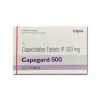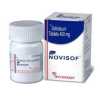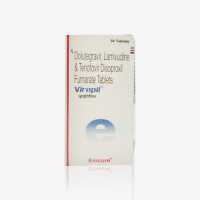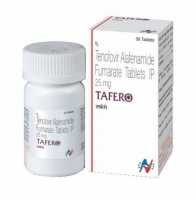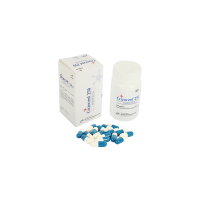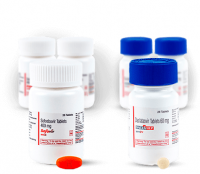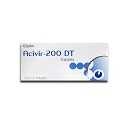Capegard 150mg (Capecitabine)
Courier service EMS
Other transport services
Air India Post International
Payment in the bank on the invoice
WestrUnion
MoneyGram
CAPEGARD 150MG
Description
Capegard 150mg is an orally-administered chemotherapeutic agent used in the treatment of metastatic breast and colorectal cancers.
Capegard 150mg belongs to prodrug, which is enzymatically changes to fluorouracil (antimetabolite) in the tumor, where it prohibits DNA synthesis and reduces growth of tumor tissue.
Capegard 150mg indication
Capegard 150mg is indicated for the treatment of Colorectal cancer
- Adjuvant treatment in Duke’s colon cancer
- First line therapy in colon-rectal cancer metastasis
Breast cancer
Capegard 150mg is indicated for the treatment in metastatic breast cancer: used in combination with docetaxel after failure of anthracycline containing chemotherapy
Capegard pharmacology
Capecitabine is a prodrug and belongs to type of chemotherapy called an anti-metabolite. The body converted capecitabine into a common chemotherapy drug called fluorouracil. It blocks cells making and repairing DNA. Cancer cells require to make and repair DNA, so they can grow and replicate.
Pharmacokinetic
Absorption
The peak plasma level at about 1.5 hours
Distribution
The human plasma protein bound to Capecitabine is occurred in less than 60%
Bio-activation and metabolism
Capecitabine is largely metabolized to 5-FU enzymatically. In liver, 60 kDa carboxylesterase hydrolyses to 5’-deoxy-5-fluorocytidine.
Excretion
The route of elimination of Capecitabine is occurred through urine 95.5%
The mean terminal half-life period of Capecitabine is 0.75 hour
Dosage and administration
Monotherapy
First line therapy of patients with advanced colorectal cancer
The prescribed dose of Capegard is 1250mg/m2 should be administer orally as twice daily (morning and evening dose 2500mg/m2); treatment follow for 2 weeks followed by 1-week rest period given as 3 weeks cycle
Adjuvant therapy for Duke’s colon cancer
The prescribed dose of Capegard is 1250mg/m2 orally as twice daily (morning and evening dose 2500mg/m2); for 2 weeks followed by 1 week given as 3 weeks for total 8 cycles (24 weeks)
Breast cancer
Monotherapy
Prescribed dose is 1250mg/m2 should be administer as orally for twice daily
In combination with docetaxel the recommended dose is 1250mg/m2 of Capegard with 75mg/m2 of docetaxel for 3 weeks
Capegard should be administered within 30 minutes after a meal
In pediatric
The safety and efficacy of the Capegard tablets in pediatric patients has not been established
Side effects
Common side effects of Capegard 150mg
- Decreased appetite
- Decreased low bloodplatelet count
- Decreased white blood cells
- dehydration
- Difficult or labored breathing
- eyeirritation
- fever
- flusymptoms
- hair loss
- headache
- Inflamed and soremouth
- Anemia
- Bloody, black, or tarry stools
- Chest pain
- Coughing up blood
- lightheadedness
- Loss of appetite
- Mild skinrash
- Nausea
- Pale skin
- Rapid heart rate
- Severe diarrhea
- dyspnea
- stomachpain or upset
- Swelling, rapid weight gain
- tastedisturbance
- tiredfeeling
- Trouble concentrating
- vomitthat looks like coffee grounds
- Vomiting
- Weakness
- Yellowing of the skin or eyes (jaundice)
Post marketing effects of Capegard 150mg includes
- skin lesions
- failure in liver
- tear duct obstruction
- acute kidney failure secondary to dehydration
- eye inflammation with severe pain
- damage in white matter brain
Contraindication
Capegard 150mg is contraindicated to renal impairment patients
Capegard 150mg is contraindicated in patients with hypersensitivity to Capegard 150mg or other components
Drug interaction
Capegard 150mg combination with warfarin and phenprocoumon, bleeding occurs. These events occurred within several days and even a month also
when combination of phenytoin and Capegard 150mg, toxicity related to elevation of phenytoin levels
The toxicity and concentration of 5-FU increased by Leucovorin. In elderly patients, phenytoin and Leucovorin is administered weekly which may cause; diarrhea, dehydration, enterocolitis which may causes death.
Other than warfarin, there is no drug interaction occurs while concomitant with CYP2C9 substrates
Care should be taken while combination of Capegard 150mg with CYP2C9 substrates
Precaution and warning
Coagulopathy: concomitant with warfarin, anti-coagulant response should be monitored
While using drug may results in bleeding, death; monitor anticoagulant response
When administrating the drug may cause cardiomyopathy and acute decreases in LVEF
Diarrhea: patients with severe diarrhea should be monitored
Cardio toxicity: while taking Capegard 150mg, cardio toxicity occurs like; myocardial infarction, angina, dyshythmias, cardiac arrest sudden death, Cardiomyopathy
Dihydropyrimidine dehydrogenase deficiency
Embryo fetal toxicity: occurs fetal harm; discuss with women of the potential risk to the foetus
On basis of animal studies regarding fetal risk, therapy may impair fertility in females and males of reproductive potential
Hyperbilirubinemia: If hyperbilirubinemia occurs, break off therapy immediately until it resolves or reduces in intensity
Mucocutaneous and dermatologic toxicity
Hematological problems
Care should be taken while using in geriatric patients
Hepatic insufficiency
Pregnancy and lactation
Pregnancy category: D
Capegard 150mg may cause harm to the fetus
Generally, Capegard 150mg should not be recommended in pregnancy or women who are become pregnant
Breast feeding is not recommended
Storage
Capegard 150mg should be stored at 20oC to 25oC (68oF to 77oF)
Missed dose
If dose is forgetting to take then have the dose immediately before next dose arrives or the missed dose should be skipped and follow the regular dosing schedule
Do not double the dose
Must consult with medical oncologist and follow the suggestions
- Trade name Capegard 150mg
- Substance Capecitabine
- Manufacturer Cipla Ltd
- Packaging 120 tablets
- Country of origin India
-
Convenient deliveryWe deliver to all countries of the World *. We cooperate only with trusted cargo carriers.
-
CONTROL AND INSPECTIONItem is checked before shipping! All the medicines are delivered directly from the manufacturer and sent from India to the client's address.
-
CHOOSE USWe provide the best price, including insurance against loss through the fault of the carrier. Our company cooperates directly with the largest manufacturers of medicines in India.
-
Promotions and DiscountsWe offer a flexible system of discounts for our customers and fixed discounts for current offers. Regular customers receive a discount of up to 10% of the amount of orders, as well as a remuneration system for referring customers via a referral link.
Запазете любимите си елементи към отметки
Това няма да загуби желаната опция!


